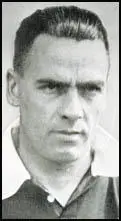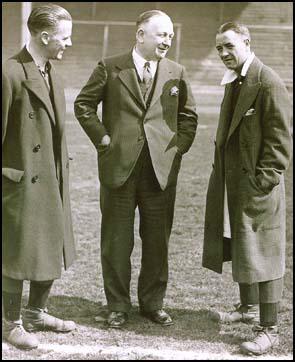Bob John

Robert (Bob) John was born in Barry Dock, Wales on 3rd February 1899. He played local football for Caerphilly and Barry Town before joining Arsenal in January 1922.
The manager, Leslie Knighton, gave John his debut against Newcastle United on 28th October 1922. He eventually took over from Tom Whittaker as the team's regular left-half.
The club enjoyed little success under Knighton's managership. Arsenal's best league position was 9th in 1921. In the FA Cup Arsenal only got beyond the second round once, in 1922, when they lost to Preston North End in the quarter finals after a replay.
In 1922 Bob John won his first international cap for Wales against Scotland. Over the next fourteen years he played fifteen times for his country. According to Jeff Harris, the author of Arsenal Who's Who, John was "noted for his fine distribution as well as being a prodigious ball winner."
Henry Norris, the chairman of Arsenal, sacked Leslie Knighton at the end of the 1924-25 season. Herbert Chapman, the highly successful manager of Huddersfield Town, was persuaded to join Arsenal. Whereas Huddersfield had won the championship, Arsenal had narrowly escaped relegation by finishing in 20th position.
The first man that Herbert Chapman signed was Charlie Buchan, who had scored 209 goals in 380 games for Sunderland. Chapman also purchased Herbert Roberts, Joe Hume and Cliff Bastin.
In the 1925-26 season Arsenal finished in second-place to Chapman's old club, Huddersfield Town. Top scorer was Jimmy Brain who established a new club record with 33 goals. John played in 29 league games that season.
Henry Norris refused to allow Herbert Chapman to spend much money to strengthen his team and in the 1926-27 season Arsenal finished in 11th position. However, they did enjoy a good run in the FA Cup. They beat Port Vale (0-1), Liverpool (2-0), Wolverhampton Wanderers (1-0) and Southampton (2-1) to reach the final at Wembley against Cardiff City. However, they lost the game 1-0.
Herbert Chapman gradually adapted the "WM" formation that had originally been suggested by Charlie Buchan. Chapman used his full-backs to mark the wingers (that job had previously been done by the wing-halves). He also developed what became known as the counter-attacking game. This relied on the passing ability of Alex James and goalscoring forwards like David Jack, Jimmy Brain, Joe Hume, Cliff Bastin, and Jack Lambert. Chapman also built up a good defence that included players such as Bob John, Alf Baker, Eddie Hapgood, Herbert Roberts, Tom Parker and George Male.

Success was not immediate and Arsenal finished in 14th place in the 1929-30 season. John played in 34 league games that year. Arsenal did much better in the FA Cup. Arsenal beat Birmingham City (1-0), Middlesbrough (2-0), West Ham United (3-0) and Hull City (1-0) to reach the final against Chapman's old club, Huddersfield Town. Arsenal won the game 2-0 with goals from Alex James and Jack Lambert.
Alex James was injured for a large part of the 1931-32 season and this was a major factor in Arsenal losing the title by two points to Everton. James was back in the 1932-33 season and Arsenal won the First Division by four points that season. On 2nd April 1932 John broke the club appearance record of 327 that had been held by Percy Sands.
When Herbert Chapman died in January 1934, George Allison was appointed as the new manager. Allison was a radio journalist who was also the club's managing director. However, he had no experience of football management. At the time of Chapman's death Arsenal were top of the table and Joe Shaw and Tom Whittaker were allowed to run the team until the end of the season. That year the team won the First Division title. That year John played in 31 league games.
John lost his place in the first-team when George Allison signed Wilf Copping, the England international. He played the occasional game and by the time he retired in 1938 he had played 421 league games for Arsenal.
John was a coach at West Ham United, a trainer and manager at Torquay United, trainer of Crystal Palace and a coach and scout for Cardiff City.
Bob John died in July 1982.
